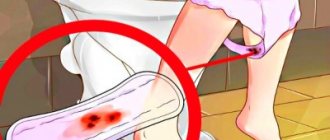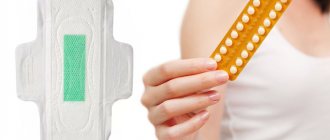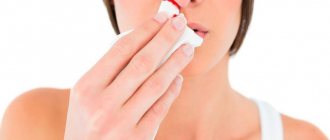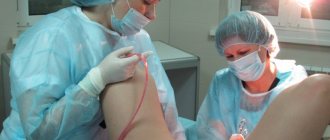Causes of brown discharge during menopause
Can there be brown discharge during menopause? Definitely yes. However, you need to understand that this indicates disorders in the body. It could even be a symptom of a serious illness.
The discharge that occurs during menopause can have a different smell, thickness, and shade: from yellow or light brown to dark brown. In most cases, they are not too abundant and resemble “daub”; they stain underwear and bed linen.
Brown discharge often occurs due to thinning and dryness of the inner walls of the vagina. Small microtraumas cause inflammation, and bacterial and viral infections can occur. The brown color of the discharge indicates that it contains blood.
Therapy comes down to local replenishment of the deficiency of female sex hormones and hydration: the patient uses hormonal suppositories, as well as moisturizing lubricants.
If the discharge is brown, there is an admixture of blood in it.
Gynecologists identify the following list of diseases that provoke vaginal bleeding:
- endometriosis is a pathological condition that is accompanied by the proliferation of glandular tissues of the uterus. A woman complains of pain, brown secretions, and cysts form in the ovaries;
- Trichomoniasis is a disease that is sexually transmitted. The discharge is foamy, has a watery structure, is colored yellow-green, and has an unpleasant odor;
- vulvovaginitis is an inflammatory process that occurs as a result of thinning of the vaginal mucosa. Lack of lubrication leads to the formation of microcracks, inflammation, and dysbacteriosis. Such a violation leads to sticky, mucous discharge of a yellow-green color with purulent impurities;
- Cervicitis is an inflammatory process that affects the mucous membrane of the cervix as a result of decreased immunity. In severe cases, it is accompanied by inflammation of the endometrium, the formation of yellow-brown discharge, and blood clots;
- fibroids are a benign neoplasm, the growth of which is accompanied by brown discharge, blood clots, uterine bleeding, and anemia. Patients also complain of pain in the lower back or lower abdomen. As fibroids grow, the pain becomes constant, aching, and sometimes cramping;
- atrophic vaginitis leads to dryness and thinning of the lining walls of the vagina, inflammation, and infections. Accompanied by redness, itching, pain, inflammation, light or dark vaginal discharge, bleeding after sexual intercourse, discomfort;
- neoplasms in the ovaries are accompanied by vaginal discharge, which is similar to menstrual bleeding;
- polyp is a focal lesion of the endometrium in which the uterine mucosa grows. These are single or multiple neoplasms with a wide base or stalk. Causes spotting after sexual intercourse. During menopause, bleeding may be heavier. Regular blood loss provokes anemia, pale skin, weakness, dizziness;
- taking, as well as discontinuing the use of hormonal drugs, causes thickening of the endometrium and increases the risk of uterine bleeding. The discharge is dark brown in color.
Prevention of discharge during menopause
When the situation is resolved successfully, and the doctor gives instructions on further lifestyle and treatment, he will definitely have to mention preventive measures, which include:
- Since the walls of the vagina become narrower and more brittle during menopause, you need to be especially careful during sex, as there is a risk of injuring them. To prevent this from happening, you need to use a lubricant, hormonal-based suppositories, or use traditional medicine methods.
- During menopause, it is important to slightly adjust your diet: include as many fresh vegetables and fruits as possible, low-fat milk products, especially cottage cheese, as it is rich in calcium, and during menopause such an element is vital.
- And it is important to regularly subject your body to feasible physical activity: walk more, do gymnastics, and harden yourself. It can also be classes in the gym and dance class.
Thus, discharge during menopause is a rather alarming signal that in no case should be ignored. Therefore, those women who have a problem with spotting after menopause have a direct route to the doctor.
Interesting and educational video on the topic:
About
Kinds
Gynecologists note the following types of pathological discharge that should be alarming:
- watery, containing blood impurities;
- purulent, gray-green in color with a thick consistency and unpleasant odor;
- foamy with mucus impurities and an unpleasant odor;
- yellow with an unpleasant odor;
- spotting blood, colored red-brown;
- white cheesy, with white lumps, which are accompanied by itching and a sour smell.
Depending on the nature of the discharge, its abundance and accompanying symptoms, the doctor selects the appropriate treatment regimen.
Why should there be no blood in postmenopausal discharge?
Blood in mucus from the female genital tract during reproductive age has a natural origin during menstruation.
The separation of the functional layer of the endometrium occurs with damage to its vessels, from where it flows. A year or more after the end of menstruation, this organ atrophies and becomes smaller. The division into the main and functional layers no longer exists in it. The endometrium becomes thin and flat.
There are no longer any other circumstances influencing its cyclic development - sex hormones. Actually, this is the main sign and culprit of menopause. And therefore, the secreting abilities of the internal reproductive organs are, in principle, reduced. This means that postmenopausal discharge, if there is any discharge, is in very small quantities. There is a sign of dryness of the mucous membranes of the perineum and vagina, which causes inconvenience, but is the norm.
However, discomfort can and should be dealt with; there are appropriate means for moisturizing and restoring. But for all these reasons, there should not be discharge with blood, especially copious amounts. Yes, both spotting ones and those in which there is more mucus than red blood cells should be studied.
Warning symptoms
Normally, vaginal discharge is transparent or has a light, creamy color and does not have a strong odor. Volume – no more than 1.5-2 ml. They do not provoke pain, discomfort, itching, or burning in a woman.
Brown discharge during menopause is often associated with endometrial diseases and infectious processes. The following accompanying symptoms require special attention:
- secretion of ichor in a large volume;
- pain in the lower abdomen;
- itching;
- burning;
- foamy, cheesy, mucous discharge;
- blood clots;
- frequent, painful urination;
- unpleasant odor from the vagina;
- increased body temperature;
- redness and swelling of the genitals;
- pain in the lower abdomen that radiates to the lower back and lower extremities;
- anemia: pale skin, brittle hair, nails, longitudinal stripes on the nail plates, deterioration of skin quality, dizziness, apathy, weakness;
- disturbance of psycho-emotional state, decreased ability to work;
- nausea that progresses to vomiting;
- headache.
What kind of discharge is normal?
At the age of 45-50 years, a woman’s hormonal activity subsides, as a result of which the uterine mucous masses change their character. They can be used to determine the absence or presence of pathologies. In the early stages of menopause, the changes are not so noticeable, but after a while the cervix stops secreting mucus in the required amount, decreases in size and even causes vaginal dryness.
Normal discharge during menopause should not be accompanied by discomfort and irritation of the external or internal genital organs. Mucous transparent discharge is considered normal if its amount does not exceed 2 ml per day. They may have a yellowish-brownish tint, without an unpleasant odor. The secretion consists of plasma, mucus and lymph, so it resembles rice broth.
Over time, the secretion becomes completely transparent, not watery. Slight variations in quantity or shade are acceptable. If the consistency becomes too liquid, this indicates the presence of a disease. Normally, the discharge is odorless, not watery, and sometimes completely colorless. Any deviations are a reason to consult a doctor. Timely treatment allows you to avoid many complications.
Diagnostics
When visiting a doctor, it is recommended to describe the symptoms that arise in as much detail as possible: the nature and amount of discharge, consistency, smell, general condition, basal body temperature, accompanying complaints. To confirm the diagnosis, the doctor conducts an oral interview with the patient and collects anamnesis, including family history. Next, a face-to-face examination is carried out on a gynecological chair and a smear is taken.
Examination with a speculum reveals tumors, polyps, and mechanical damage that can cause vaginal discharge.
Additionally prescribed:
- ultrasound examination of the pelvic organs, which reveals neoplasms: cysts, polyps, allows you to determine the thickness of the endometrium;
- biochemical blood test: if the results of the study indicate an infection, then the causative agent of the pathological process is identified;
- biopsy if an oncological process is suspected;
- colposcopy - the process uses an optical device that magnifies the area being examined and illuminates it.
Diseases of the reproductive system can have a similar clinical picture; only comprehensive diagnostics allows an accurate diagnosis to be made.
Diagnostic algorithm for postmenopausal bleeding
Anamnesis
The history should include a detailed description of the nature, volume and type of bleeding. Find out the connection between bleeding and sexual intercourse and other possible causes. Important information can be obtained from the patient's premenopausal menstrual history. Of particular importance is a history of taking medications/HRT/tamoxifen or topical vaginal medications. It is important to establish the origin of bleeding - true vaginal, urethral and rectal, as well as whether there is a history of easy formation of subcutaneous hematomas and bleeding from other locations.
Survey
A general physical examination evaluates the nature of the bleeding (chronic bleeding with a stable patient or acute blood loss requiring immediate resuscitation). Examination of the abdomen may reveal a mass in the abdominal cavity. The examination of the pelvic organs begins with an examination in good lighting. If conditions exist, a Pap smear can be taken, if necessary in combination with colposcopy and cervical biopsy. During the examination, you can see a polyp coming from the ectocervix, cervical canal or uterine cavity.
During a two-handed examination, uterine fibroids and ovarian masses are palpated. With age, the size of the uterus decreases. Enlargement of the uterus in postmenopause in the absence of fibroids or adenomyosis is a pathology. The doctor must have oncological alertness regarding endometrial tumors.
Research methods
With transvaginal ultrasound, it is always necessary to measure the thickness of the endometrium and determine its homogeneity. Identified polyps, submucous fibroids and adnexal masses are important indications of possible causes of bleeding.
When polyps or submucous uterine fibroids are suspected, hydrohysterosonography, known as saline infusion ultrasound, is particularly useful.
Endometrial calcification should raise suspicion for such a rare disease as tuberculous endometritis. In many developing countries, tuberculous endometritis is quite common.
Color Dopplerography of the vessels of the uterus and ovaries confirms, but does not exclude the tumor etiology of the process.
These radiation research methods clarify the etiology of the disease. Despite this, histological confirmation of the diagnosis is necessary.
To assess blood loss or, if necessary, surgical intervention, a detailed (general) blood test is required.
Cytology
The Pap smear provides information about cervical disease, but it is false negative in 40-50% of patients with cervical cancer. The NHS Cervical Screening Program recommends stopping cervical cytology tests after age 65.
Examination of uterine aspirate is a cost-effective and virtually non-invasive procedure that can be easily performed on an outpatient basis. A positive result confirms the disease. However, a negative result, especially with other suspicious signs, should be confirmed by hysteroscopy.
Endometrial biopsy
Endometrial biopsy has become the standard of care for patients with postmenopausal bleeding. If there is insufficient material or the impossibility of taking it due to the patient’s discomfort, cervical stenosis or lack of tissue, hysteroscopy with a biopsy under vision control and curettage of the uterine mucosa are necessary.
Hysteroscopy with biopsy
The “gold standard” for examining the endocervix and uterine cavity is diagnostic hysteroscopy with a biopsy under visual control of any suspicious area of the endocervix, followed by curettage. The cervical canal is dilated, the uterine cavity is examined, and a biopsy of any suspicious area of the endometrium is performed. If polyps are present, a hysteroscopic polypectomy is performed, followed by curettage of the uterine cavity.
In postmenopausal patients with a homogeneous endometrium thickness <4 mm without pathological vascularization in the absence of HRT, the likelihood of cancer is extremely low. Many clinicians use an endometrial thickness of 5–6 mm as a reference point for normal endometrial thickness at menopause. With continuous combined HRT or taking tibolone, the permissible endometrial thickness is 5.5 mm, in women taking raloxifene or continuous HRT, on the 5th day of the cycle - 4 mm, and in women taking tamoxifen - 8 mm. Despite this, if symptoms persist, hysteroscopy is performed regardless of the thickness of the endometrium.
Colposcopy with cervical biopsy
If the results of a cervical examination or a questionable cervical Pap smear are questionable, colposcopy with a biopsy from all suspicious areas is necessary.
Treatment
Treatment is selected by the gynecologist, taking into account the cause of the brown discharge, the patient’s age, and concomitant diseases. Conservative and radical methods of therapy are used. In the first case, the woman is advised to take hormonal, anti-inflammatory, antibacterial agents, and local moisturization of the vaginal mucosa.
In the second, removal of the uterus or ovaries may be required. The operation is performed only as a last resort, taking into account possible risks and complications. To achieve the best result, it is recommended to follow the instructions of a specialist and refrain from self-medication.
| Hormonal changes | Hormone replacement therapy drugs are prescribed by a doctor after a preliminary examination, taking into account risk factors:
|
| Diseases of infectious origin |
|
| Vulvovaginitis |
|
| Endometriosis | Conservative treatment:
|
| Malignant neoplasms |
Removing the uterus may also require excision of surrounding lymph nodes. |
For severe blood loss, drugs with a hemostatic effect are used: Aminocaproic acid, Vicasol.
It is also recommended to take additional vitamin D3 after identifying its level in the body, magnesium, vitamin C, as well as other vitamins, microelements, amino acids according to indications. It is necessary to monitor nutrition, physical activity, compliance with the work and rest schedule, and go to bed on time.
Identification of disease by color
Gynecological diseases can be identified by the color of the discharge. Changes in the body during menopause, including in the genitourinary area, are caused by a decrease in the functionality of the ovaries. The organs stop producing hormones, gradually shrink, their size decreases, and the tissue is replaced by connective tissue. Thinning of the endometrium, shortening of the fallopian tubes, overgrowth of the cervix, thinning of its walls and decreased elasticity lead to injury to the organ during sexual intercourse.
In this case, women may experience pain, burning and other unpleasant sensations. In such cases, the risk of infection of the vaginal mucosa and the development of fungal infections increases. Manifestations may be accompanied by the presence of bloody, bloody or pink discharge.
If the mucous or watery secretion is odorless and its quantity is insignificant, then the female reproductive system will be within normal limits.
Yellow and brown discharge is considered pathological. They may indicate the development of vaginitis, infection of the vaginal microflora with bacteria or viruses that tend to multiply quickly. Usually the process ends with active inflammation, accompanied by the release of pus. During menopause, women often experience burning and itching in the intimate area, and the production of mucus in the cervix decreases, which is the cause of unpleasant symptoms.
Representatives of the fair sex during menopause are often diagnosed with urogenital disorders, expressed by an increased urge to urinate, incomplete emptying of the bladder, and a feeling of discomfort. When metabolic processes in the body are disrupted, women experience green, yellow, dark discharge or spotting. Most often this happens in the presence of excess weight, diabetes, arterial hypertension and endometriosis.
What do you need to remember?
- Brown discharge during menopause is a reason to consult a doctor and refrain from self-medication.
- Brown discharge may indicate endometriosis, vulvovaginitis, infectious diseases, vaginal candidiasis, hormonal disorders, benign or malignant neoplasms.
- To choose the right treatment, the volume, smell and consistency of the discharge, accompanying symptoms, ultrasound and laboratory results are taken into account.
- During therapy, conservative and radical methods are used.
Literature
- Baranova V.G., Arsenyeva M.G., Raskin AM Physiology and pathology of menopause in women. JL: Medicine, 1965. - P. 270.
- Benerishke K. Reproductive endocrinology / Ed. ed. S.K. Jena, R.B. Jaffe. M., 1998. - T. 1. - P. 531-560.
- Berezina I.I. Menopause. M.: Medicine, 2002. - P. 5-12.
- Vikhlyaeva E.M. Menopausal syndrome // Gynecological endocrinology // Ed. K.N. Zhmakina - M.: Medicine, 1980. - P. 105-134.
- Frolova O.G. Women's reproductive health // Quality of life. - M.: Medicine, 2004. No. 3 (6). — P. 9-12.
What to do
If bloody discharge is detected during menopause, it is necessary to establish the origin and location of the focus that led to the blood flow, and to find the cause of such unfavorable symptoms. Timely and high-quality diagnosis of the pathology gives the woman every chance of a full recovery. Gynecologists use curettage in treatment. This method performs research tasks. It is hoped that after the procedure, the disturbing discharge will disappear. The procedure is capable of providing therapeutic therapeutic effects.
Patients over 50 years of age are effectively helped by the use of medications that contain androgens that can inhibit sexual function. To eliminate climacteric syndromes, conventional sedatives are used. Along with the treatment recommended for the underlying disease, the gynecologist also pays attention to techniques aimed at the complete recovery of the female body. To do this, you will need to change your diet - increase the content of vegetables, fruits and fermented milk products, in particular cottage cheese.
To eliminate the negative effects of menopause and avoid the accompanying transformations in bone tissue, you need to use therapeutic exercises, use feasible loads through sports, but first you need to strictly calculate them. Activity and a good mood can prolong youth and go through menopause painlessly.
What should you be wary of?
Consultation with a gynecologist and examination is necessary in the following cases:
- 1 Discharge is accompanied by pain in the lower abdomen, dyspareunia, and discomfort.
- 2There is an unpleasant smell.
- 3 Changed color : the discharge has become yellow, gray, greenish, white or brown.
- 4 The consistency of the discharge resembles water , liquid or foamy.
- 5 Copious discharge , panty liners are not enough for the whole day.
- 6 The appearance of blood impurities in any quantity.
The proximity of the urethra and vagina is often accompanied by involvement of the urethral mucosa in the pathological process. This is manifested by dysuric disorders: increased frequency and pain of urination, unpleasant sensations, and frequent urges.











